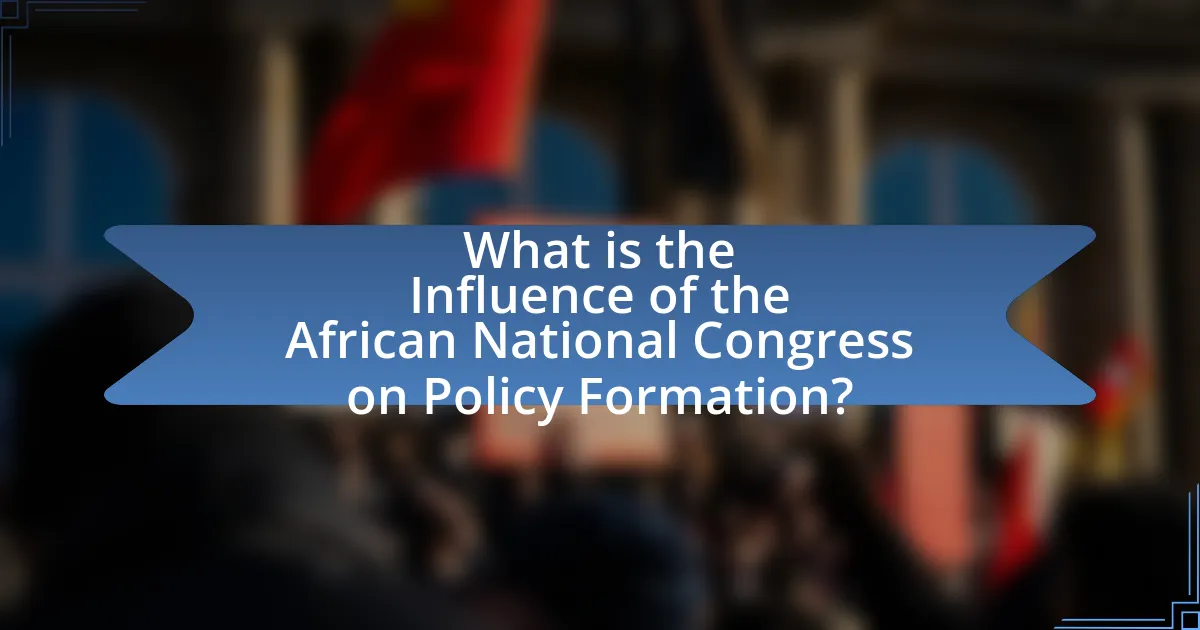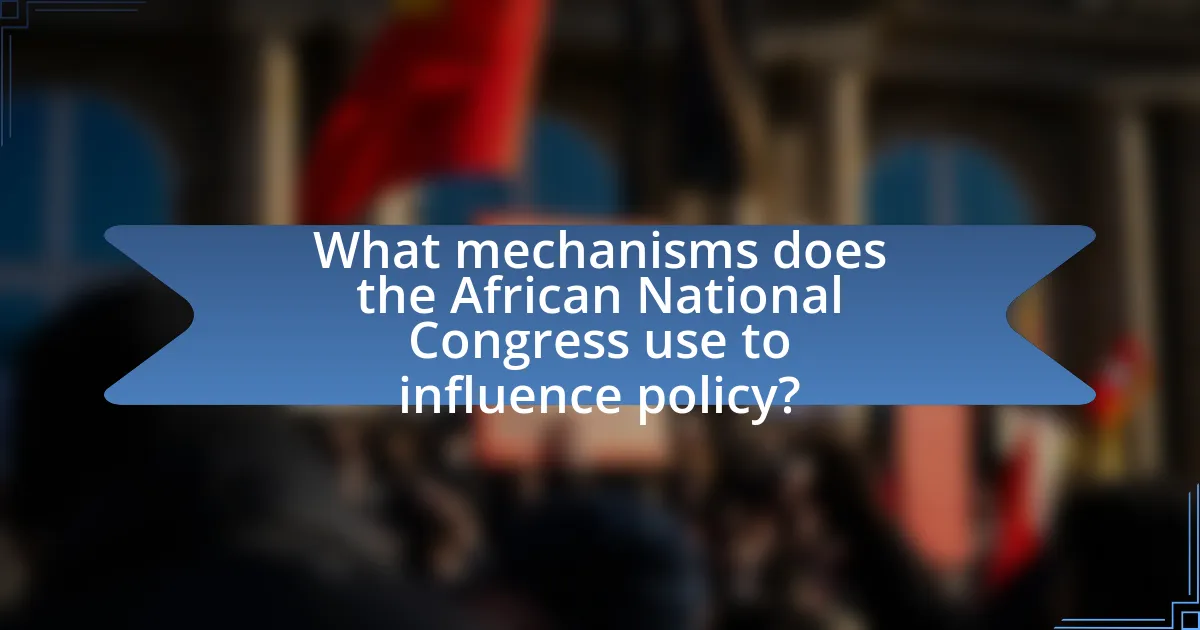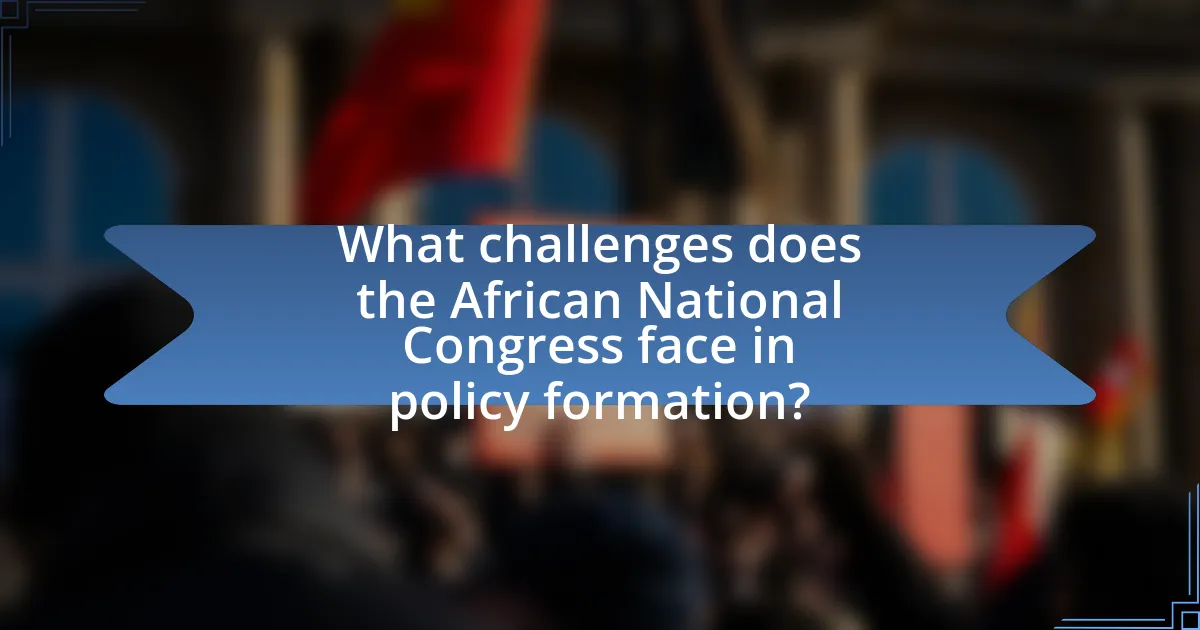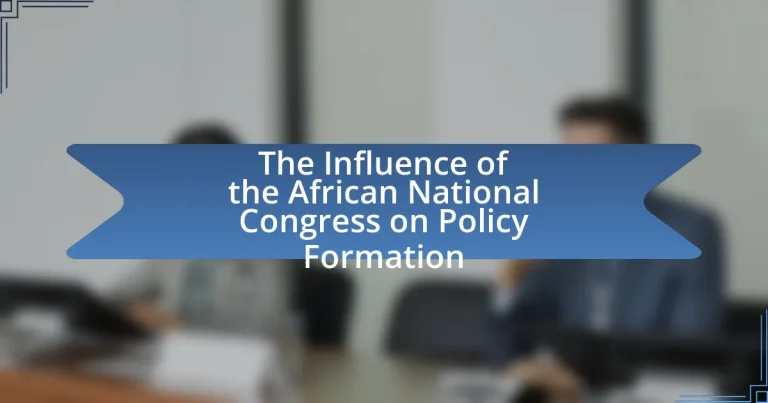The African National Congress (ANC) has played a pivotal role in shaping policy formation in South Africa since its establishment in 1912, particularly after the end of apartheid in 1994. The ANC’s influence is evident in key policies aimed at social justice, economic transformation, and nation-building, such as the Reconstruction and Development Programme (RDP) and the National Development Plan. The article explores the mechanisms through which the ANC engages with stakeholders, the impact of internal dynamics and external factors on policy decisions, and the challenges the party faces in maintaining coherence and effectiveness in its policy agenda. Additionally, it highlights best practices for enhancing stakeholder engagement and draws lessons from global political entities to improve the ANC’s policy formation process.

What is the Influence of the African National Congress on Policy Formation?
The African National Congress (ANC) significantly influences policy formation in South Africa by shaping legislative agendas and national priorities. As the ruling party since the end of apartheid in 1994, the ANC has implemented policies focused on social justice, economic transformation, and nation-building, reflecting its historical commitment to equality and human rights. For instance, the ANC’s Reconstruction and Development Programme (RDP) aimed to address the socio-economic disparities created by apartheid, leading to policies in housing, education, and healthcare. Additionally, the ANC’s influence is evident in the establishment of the National Development Plan, which outlines long-term strategies for economic growth and development. This policy framework is supported by the ANC’s electoral mandate, which reinforces its role in guiding South Africa’s legislative landscape and responding to the needs of its constituents.
How has the African National Congress shaped South African policy since its inception?
The African National Congress (ANC) has significantly shaped South African policy since its inception in 1912 by advocating for anti-apartheid legislation and promoting social justice. The ANC’s policies led to the dismantling of apartheid laws in the early 1990s, culminating in the establishment of a democratic government in 1994, which introduced a new constitution emphasizing human rights and equality. The ANC has since influenced policies in areas such as land reform, education, and healthcare, aiming to address historical inequalities. For instance, the Reconstruction and Development Programme (RDP) initiated in 1994 sought to provide housing, water, and electricity to previously marginalized communities, demonstrating the ANC’s commitment to socio-economic transformation.
What key policies have been influenced by the African National Congress?
The African National Congress (ANC) has significantly influenced key policies in South Africa, particularly in areas such as land reform, education, health care, and social welfare. The ANC’s 1994 Reconstruction and Development Programme (RDP) aimed to address the socio-economic disparities created by apartheid, promoting access to basic services and housing. Additionally, the ANC’s policies have led to the introduction of the National Health Insurance scheme, aimed at providing universal health coverage. The ANC has also prioritized the implementation of the Broad-Based Black Economic Empowerment (B-BBEE) policy to promote economic participation among historically disadvantaged groups. These policies reflect the ANC’s commitment to transforming South African society and addressing historical injustices.
How does the African National Congress prioritize policy issues?
The African National Congress prioritizes policy issues through a structured approach that emphasizes socio-economic development, equality, and social justice. This prioritization is reflected in their policy frameworks, such as the National Development Plan, which outlines key areas like poverty alleviation, education, and healthcare as critical for national progress. The ANC also conducts regular consultations with stakeholders, including civil society and business sectors, to align their policies with the needs of the population, ensuring that their legislative agenda addresses pressing societal challenges.
Why is the African National Congress significant in the context of policy formation?
The African National Congress (ANC) is significant in the context of policy formation because it has been the ruling party in South Africa since the end of apartheid in 1994, shaping national policies that address social, economic, and political issues. The ANC’s policies have focused on promoting equality, economic development, and social justice, reflecting its commitment to the principles outlined in the Freedom Charter, which serves as a foundational document for the party. For instance, the ANC’s implementation of the Reconstruction and Development Programme (RDP) aimed to address the socio-economic disparities created by apartheid, demonstrating its influence on policy direction and priorities in post-apartheid South Africa.
What historical events have impacted the African National Congress’s policy influence?
The African National Congress’s policy influence has been significantly impacted by key historical events such as the formation of the ANC in 1912, the Sharpeville Massacre in 1960, the Soweto Uprising in 1976, and the end of apartheid in 1994. The establishment of the ANC marked the beginning of organized resistance against racial discrimination in South Africa. The Sharpeville Massacre, where police killed 69 protesters, galvanized international condemnation and support for the anti-apartheid movement, leading to increased pressure on the South African government. The Soweto Uprising, a student-led protest against Afrikaans as the medium of instruction, highlighted the youth’s role in the struggle and drew global attention to the injustices of apartheid. Finally, the transition to democracy in 1994, following negotiations led by figures like Nelson Mandela, allowed the ANC to implement policies that addressed historical inequalities and shaped the new South African state. These events collectively shaped the ANC’s policy framework and its approach to governance.
How does the African National Congress’s ideology affect its policy decisions?
The African National Congress’s ideology significantly influences its policy decisions by prioritizing social justice, equality, and economic transformation. This ideological framework drives the ANC to implement policies aimed at redressing historical injustices, such as land reform and affirmative action, which are designed to benefit previously marginalized communities. For instance, the ANC’s commitment to the Freedom Charter, which emphasizes the need for a democratic and non-racial South Africa, shapes its approach to governance and policy-making, ensuring that policies reflect these core values. Additionally, the ANC’s focus on economic empowerment is evident in its policies aimed at promoting black economic participation and addressing wealth disparities, as seen in initiatives like the Broad-Based Black Economic Empowerment Act.

What mechanisms does the African National Congress use to influence policy?
The African National Congress (ANC) influences policy through legislative processes, party structures, and public engagement. The ANC, as the ruling party in South Africa, utilizes its majority in Parliament to pass laws and implement policies that align with its political agenda. Additionally, the ANC’s internal structures, such as the National Executive Committee, play a crucial role in shaping policy direction and priorities. Public engagement is facilitated through community outreach programs and consultations, allowing the ANC to gauge public opinion and incorporate it into policy-making. These mechanisms are evident in the ANC’s ability to enact significant legislation, such as the National Health Insurance Bill, which reflects its commitment to expanding healthcare access.
How does the African National Congress engage with stakeholders in policy formation?
The African National Congress (ANC) engages with stakeholders in policy formation through structured consultations, public forums, and collaborative workshops. These methods allow the ANC to gather input from various groups, including civil society organizations, business sectors, and community representatives, ensuring diverse perspectives are considered. For instance, the ANC often holds policy conferences where stakeholders can discuss and influence policy directions, reflecting the party’s commitment to inclusive governance. This approach is supported by the ANC’s historical emphasis on participatory democracy, as outlined in its 1994 Reconstruction and Development Programme, which aimed to involve citizens in decision-making processes.
What role do public consultations play in the African National Congress’s policy-making process?
Public consultations are integral to the African National Congress’s policy-making process as they facilitate stakeholder engagement and ensure that diverse perspectives are considered. These consultations allow the ANC to gather input from various sectors of society, including civil society organizations, community groups, and the general public, which enhances the legitimacy and relevance of its policies. For instance, the ANC often conducts public meetings and forums to discuss proposed legislation, enabling citizens to voice their opinions and influence decision-making. This participatory approach not only strengthens democratic governance but also aligns policy outcomes with the needs and aspirations of the populace, thereby fostering greater accountability and transparency within the party’s governance framework.
How does the African National Congress collaborate with other political entities?
The African National Congress (ANC) collaborates with other political entities primarily through coalition-building and strategic alliances. This collaboration is evident in its partnerships with smaller parties and civil society organizations to advance shared policy goals, particularly during election campaigns and in legislative processes. For instance, the ANC has historically formed coalitions with parties like the South African Communist Party and the Congress of South African Trade Unions, which are part of the broader tripartite alliance, to strengthen its political influence and policy initiatives. Additionally, the ANC engages in negotiations and discussions with opposition parties to foster consensus on critical national issues, demonstrating its commitment to inclusive governance and policy formation.
What strategies does the African National Congress employ to implement its policies?
The African National Congress employs a range of strategies to implement its policies, including legislative advocacy, grassroots mobilization, and coalition-building. Legislative advocacy involves the ANC utilizing its majority in Parliament to pass laws that align with its policy objectives, such as the National Development Plan aimed at economic growth and social equity. Grassroots mobilization is evident through community engagement initiatives that encourage public participation in policy discussions, ensuring that the voices of citizens are heard and considered. Coalition-building with other political parties and civil society organizations enhances the ANC’s ability to garner support for its policies, as seen in its collaborations during the formation of the National Economic Development and Labour Council. These strategies collectively enable the ANC to effectively translate its policy goals into actionable programs and legislation.
How does the African National Congress utilize legislative processes to enact policies?
The African National Congress (ANC) utilizes legislative processes to enact policies by leveraging its majority in the South African Parliament to propose, debate, and pass legislation that aligns with its political agenda. The ANC initiates policy proposals through various parliamentary committees, where members draft bills that reflect the party’s objectives, such as social justice and economic transformation. Once introduced, these bills undergo a series of readings and debates, allowing for input from other political parties and stakeholders. The ANC’s ability to maintain a majority facilitates the passage of legislation, as seen in the implementation of the National Health Insurance Bill, which aims to provide universal healthcare access. This process underscores the ANC’s strategic use of legislative mechanisms to fulfill its policy goals and influence national governance.
What role does advocacy play in the African National Congress’s policy implementation?
Advocacy plays a crucial role in the African National Congress’s (ANC) policy implementation by mobilizing public support and influencing legislative processes. The ANC utilizes advocacy to communicate its policy objectives, engage with communities, and ensure that the voices of marginalized groups are heard in decision-making. For instance, the ANC’s advocacy efforts during the drafting of the National Development Plan involved extensive consultations with various stakeholders, which helped shape policies that address socio-economic challenges in South Africa. This approach not only enhances the legitimacy of the policies but also fosters accountability and responsiveness within the government.

What challenges does the African National Congress face in policy formation?
The African National Congress faces significant challenges in policy formation, primarily due to internal factionalism, public discontent, and economic constraints. Internal factionalism within the party often leads to conflicting priorities and diluted policy coherence, as various factions advocate for divergent agendas. Public discontent, particularly regarding issues like unemployment and service delivery, pressures the ANC to respond effectively, complicating the policy-making process. Additionally, economic constraints, including slow growth and high debt levels, limit the government’s ability to implement expansive policies, forcing the ANC to make difficult trade-offs. These factors collectively hinder the ANC’s capacity to formulate and implement effective policies that address the needs of South African citizens.
How do internal party dynamics affect the African National Congress’s policy influence?
Internal party dynamics significantly affect the African National Congress’s (ANC) policy influence by shaping leadership decisions and ideological direction. The ANC’s internal factions, such as the Youth League and Women’s League, often advocate for differing priorities, which can lead to policy fragmentation or shifts in focus. For instance, the influence of the radical Economic Freedom Fighters (EFF) has pressured the ANC to adopt more progressive economic policies, reflecting a response to internal competition. Additionally, leadership struggles within the ANC, such as those seen during the tenure of Jacob Zuma, have resulted in policy inconsistencies and weakened the party’s overall influence on governance. These dynamics illustrate how internal conflicts and alliances within the ANC directly impact its ability to formulate and implement cohesive policies.
What conflicts arise within the African National Congress regarding policy priorities?
Conflicts within the African National Congress (ANC) regarding policy priorities primarily stem from ideological differences between factions, particularly between the more leftist elements advocating for radical economic transformation and those favoring a more moderate, market-oriented approach. The leftist faction, often aligned with the ANC’s youth league and labor unions, pushes for policies such as land redistribution and nationalization of key industries, arguing that these measures are essential for addressing historical injustices and economic inequality. Conversely, the moderate faction, which includes business-friendly leaders, emphasizes economic stability and growth through investment and partnerships with the private sector. This ideological divide has led to significant tensions within the party, impacting its ability to present a unified policy agenda and effectively govern. For instance, debates surrounding the Economic Freedom Fighters’ (EFF) calls for expropriation without compensation have intensified these conflicts, highlighting the struggle between maintaining party unity and addressing the demands of various constituencies.
How does factionalism impact the African National Congress’s policy decisions?
Factionalism significantly impacts the African National Congress’s (ANC) policy decisions by creating divisions that influence the party’s strategic direction and legislative priorities. Internal factions often compete for power and resources, leading to compromises that may dilute policy effectiveness. For instance, the rivalry between the ANC’s leftist factions and more centrist elements has historically shaped economic policies, resulting in a mixed approach that attempts to balance social equity with market-driven growth. This dynamic was evident during the discussions surrounding the National Development Plan, where differing factional interests led to a protracted debate and ultimately a policy that reflected a compromise rather than a unified vision. Such factional influences can hinder decisive action on critical issues, as seen in the ANC’s responses to land reform and economic inequality, where competing agendas have slowed progress and led to inconsistent policy implementation.
What external factors influence the African National Congress’s policy formation?
The external factors influencing the African National Congress’s policy formation include international relations, economic conditions, and social movements. International relations, particularly South Africa’s ties with other nations and organizations, shape the ANC’s approach to foreign policy and trade. Economic conditions, such as global market trends and domestic economic challenges, impact policy decisions related to economic growth and social welfare. Social movements, including civil society activism and public opinion, also play a crucial role in shaping the ANC’s policies, as they reflect the needs and demands of the populace. For instance, the ANC’s response to issues like land reform and inequality is often influenced by grassroots movements advocating for change.
How do economic conditions affect the African National Congress’s policy agenda?
Economic conditions significantly influence the African National Congress’s policy agenda by shaping priorities and responses to public needs. For instance, high unemployment rates and economic downturns often lead the ANC to prioritize job creation and social welfare programs, as seen during the 2008 global financial crisis when the government implemented stimulus measures to mitigate economic impacts. Additionally, economic growth can shift the ANC’s focus towards infrastructure development and investment in education, reflecting a response to increased revenue and public demand for improved services. Historical data shows that the ANC’s policy adjustments are closely aligned with economic indicators, demonstrating a direct correlation between economic conditions and policy formulation.
What role do international relations play in shaping the African National Congress’s policies?
International relations significantly influence the African National Congress’s (ANC) policies by shaping its diplomatic strategies and international partnerships. The ANC’s historical struggle against apartheid garnered global support, leading to policies that emphasize human rights, democracy, and social justice, reflecting international norms and expectations. For instance, the ANC’s commitment to the African Union’s Agenda 2063 aligns with its international relations focus on regional integration and development. Additionally, the ANC’s foreign policy promotes solidarity with other developing nations, as seen in its support for the Non-Aligned Movement, which underscores its commitment to multilateralism and cooperation. These international relations frameworks guide the ANC in formulating policies that resonate with global standards while addressing domestic challenges.
What best practices can enhance the African National Congress’s policy formation process?
To enhance the African National Congress’s policy formation process, implementing a structured stakeholder engagement framework is essential. This framework should prioritize inclusive consultations with diverse groups, including civil society, experts, and grassroots organizations, to gather a wide range of perspectives. Evidence from successful policy initiatives globally indicates that inclusive engagement leads to more comprehensive and effective policies, as seen in countries like Canada, where stakeholder involvement has improved public trust and policy outcomes. Additionally, utilizing data-driven decision-making can refine the policy formation process by ensuring that policies are based on empirical evidence and measurable outcomes, as demonstrated by the use of analytics in the United Kingdom’s policy development. These best practices can significantly improve the relevance and effectiveness of the African National Congress’s policies.
How can the African National Congress improve stakeholder engagement in policy-making?
The African National Congress can improve stakeholder engagement in policy-making by implementing structured consultation processes that actively involve diverse community representatives. This approach ensures that various perspectives are considered, enhancing the legitimacy and effectiveness of policies. For instance, the ANC can establish regular forums and workshops that facilitate dialogue between government officials and stakeholders, including civil society organizations, business leaders, and marginalized groups. Evidence from successful policy initiatives in other democracies shows that inclusive engagement leads to more comprehensive and accepted policy outcomes, as seen in countries like Canada, where stakeholder involvement has significantly shaped public policy.
What lessons can the African National Congress learn from other political parties globally?
The African National Congress can learn the importance of adaptability and coalition-building from other political parties globally. For instance, the Democratic Party in the United States has successfully navigated changing political landscapes by forming coalitions with various interest groups, which has allowed them to maintain relevance and influence. Similarly, the Labour Party in the United Kingdom has demonstrated the effectiveness of internal reform and engaging younger voters to rejuvenate its base, as seen in its 2017 election campaign. These examples highlight that the ANC could enhance its policy formation and electoral strategies by embracing flexibility and fostering broader alliances, thereby ensuring sustained support and addressing diverse societal needs.


